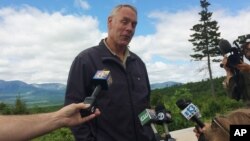Interior Secretary Ryan Zinke says his agency should be a partner with oil and gas companies that seek to drill on public land and that long regulatory reviews with an uncertain outcome are “un-American.”
Speaking Tuesday to a major energy-industry conference, Zinke described the Trump administration’s efforts to increase offshore drilling, reduce regulations, and streamline inspections of oil and gas operators.
“Interior should not be in the business of being an adversary. We should be in the business of being a partner,” Zinke said to a receptive audience that included leaders of energy companies and oil-producing countries.
Shorten permit process
Zinke said the government should shorten the permitting process for energy infrastructure — it shouldn't take longer than two years.
“If you ask an investor to continuously put money on a project that is uncertain because the permit process has too much uncertainty, ambiguity, (it) is quite frankly un-American,” he said.
The Interior Department manages 500,000 million acres — one-fifth of the U.S. land mass — as well as the lease of offshore areas for oil drilling. One-fifth of U.S. oil production takes place on land or water that the Interior Department leases to private energy companies.
Environmentalists accuse Zinke and the administration of undercutting environmental rules to help oil, gas and coal companies.
Alex Taurel, a legislative official with the League of Conservation Voters, said Tuesday that Zinke “thinks our public lands are nothing more than an ATM for his industry friends. If anything is un-American, it’s this administration’s persistent attacks on America’s public lands.”
In January, the Trump administration proposed to open up nearly all coastal areas to oil drilling, although Florida was dropped after the Republican governor and lawmakers objected, citing risk to the state’s tourism business.
States have leverage
As he has before, Zinke defended the plan, which faces fierce opposition from governors and lawmakers along the entire West Coast and much of the East Coast.
Zinke said he would listen to local objections, and he noted that states have leverage if they oppose drilling in federal water off their coastlines — they would have to approve pipelines and terminals to handle the oil.
“You can't bring energy ashore unless you go through state water,” he said.
Zinke said the United States won’t exhaust its resource of fossil fuels in our lifetime, but that cleaner-burning natural gas will take on a bigger role.
Trump 'a delightful boss'
The Trump administration, he said, is “pro-energy across the board,” and he tried to dismiss an environmental disadvantage to burning fuels that emit carbon linked to climate change. All fuels, he said, have consequences.
When solar facilities are built on public land, people can’t hunt or pursue other recreation there, he said, and wind turbines “probably chop up as many as 750,000 birds a year.”
Zinke acknowledged, however, that “certainly oil and gas and coal have a consequence on carbon.”
Zinke began his comments with a shout-out to his boss, President Donald Trump, calling him “a delightful boss,” before explaining Trump’s goal of encouraging U.S. “energy dominance.” He has frequently criticized former President Barack Obama.
U.S. oil production surged during Obama’s tenure and has kept growing, recently surpassing 10 million barrels a day, thanks to increasing output from shale formations in Texas, North Dakota and elsewhere.




